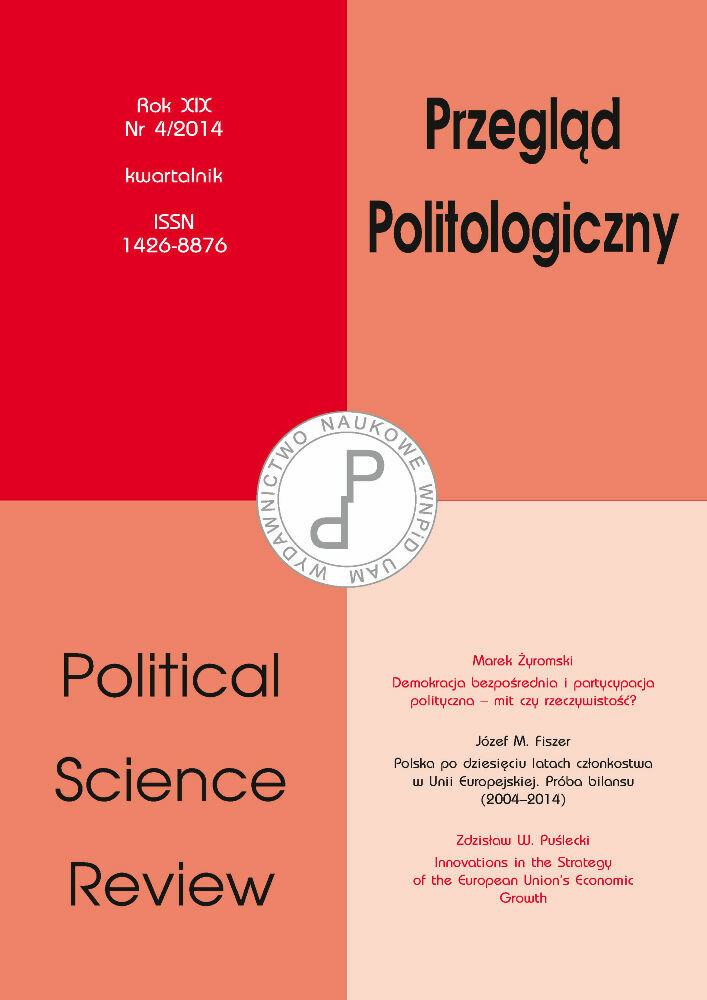Abstrakt
W dziedzinie badań poświęconych teorii reżimów występuje znaczne zróżnicowanie podejść oraz typologii stawiających sobie za cel wyjaśnienie dynamicznie zmieniającej się rzeczywistości. Zamierzeniem autora niniejszego artykułu było zaproponowanie własnej typologii obejmującej istniejące już typologie, co z kolei posłużyło do opisania i analizy wartości badawczej tychże typologii oraz powiązanych z nimi baz danych. Pozwoliło to na wskazanie relacji między opisanymi typologiami i określenie ich miejsca we właściwych im polach badawczych. Celem tego działania jest dokonanie refleksji nad stosowalnością poszczególnych typologii, pokazanie ich ograniczeń oraz ułatwienie wyboru między nimi badaczom zajmującym się analizą procesów demokratycznych oraz teorią reżimów politycznych, z zastosowaniem zarówno jakościowych, jak i ilościowych metod badawczych.
Bibliografia
Alvarez M., Cheibub J. A., Limongi F., Przeworski A. (1996), Classifying Political Regimes, “Studies in Comparative International Development”, vol. 31, no. 2, p. 3–36.
Boix C., Miller M., Rosato S. (2012), A Complete Data Set of Political Regimes 1800–2007, “Comparative Political Studies”, vol. 20, no. 10, p. 1–32.
Boogaards M. (2010), Measures of Democratization: From Degree to Type to War, “Political Research Quarterly”, vol. 63, no. 2, pp. 475–488.
Chan S. (2004), Liberalism, Democracy and Development, Cambridge University Press, Cambridge.
Cheibub J. A., Gandhi J., Vreeland J. R. (2009), Democracy and dictatorship revisited, “Public Choice”, DOI 10.1007/s11127-009-9491-2.
Cutright Ph. (1963), National political development: Measurement and analysis, “American Sociological Review”, vol. 28, no. 2, p. 253–264.
Dunn J. (2005), Democracy: A history, Atlantic books, New York.
Ekman J. (2009), Political Participation and Regime Stability: A Framework for Analyzing Hybrid Regimes, “International Political Science Review”, vol. 30, no. 1, p. 7–31.
Elman C. (2005), Explanatory Typologies in Qualitative Studies of International Politics, “International Organization”, vol. 59, no. 2, p. 293–326, DOI 10.1007/s12116-011-9088-x.
Fearon J. D., Laitin D. D. (2003), Ethnicity, Insurgency, and Civil War, “The American Political Science Review”, vol. 97, no. 1, p. 75–90.
Fishman R. M. (1990), Rethinking State and Regime: Southern Europe’s Transition to Democracy, “World Politics”, vol. 42, no. 3, p. 422–440.
Frantz E., Ezrow N. (2011), The Politics of Dictatorship: Institutions and Outcomes in Authoritarian Regimes, Lynne Rienner, London.
Gasiorowski M. J. (1996), An overview of the political regime change dataset, “Comparative Political Studies”, vol. 29, no. 4, p. 469–483.
Geddes B., Wright J., Frantz E. (2012), Autocratic Regimes, Research supported by NSF-BCS #0904463 and NSF-BCS #0904478.
Geddes B., Wright J., Frantz E. (2013) New Data on Autocratic Breakdown and Regime Transitions, Research supported by the National Science Foundation, BCS-0904478 and BCS-090463.
Gilbert L., Mohseni P. (2011), Beyond Authoritarianism: The Conceptualization of Hybrid Regimes, “St Comp Int Dev”, vol. 46, p. 270–297.
Hadenius A., Teorell J. (2007), Pathways from authoritarianism, “Journal of Democracy”, vol. 18, no. 1, p. 143–157.
Hegre H., Ellingsen T., Gates S., Gleditsch N. P. (2001), Toward a Democratic Civil Peace? Democracy, Political Change, and Civil War, 1816–1992, “The American Political Science Review”, vol. 95, no. 1, p. 33–48.
Kailitz S. (2013), Classifying political regimes revisited: legitimation and durability, “Democratization”, vol. 20, no. 1, p. 39–60.
Levitsky S., Way L. A. (2010), Competitive Authoritarianism: Hybrid regimes after the Cold War, Cambridge University Press, Cambridge.
Linz J. J. (2000), Totalitarian and authoritarian regimes, Lynne Rienner Publishers, London.
Linz J. J., Stepan A. (1996), Problems of democratic transition and consolidation: Southern Europe, South America, and post-communist Europe, Johns Hopkins University Press, Baltimore.
Mainwaring S., Brinks D., Pérez-Lińán A. (2007), Classifying political regimes in Latin America, 1945–2004, in: Regimes and democracy in Latin America: Theories and methods, ed. G. L. Munck, Oxford, p. 123–160.
Marshall M. G., Gurr T. R. (2005), Polity IV Index Project, http://www.systemicpeace.org/polity/polity4.htm.
Regan P. M., Bell S. R. (2010), Changing Lanes of Stuck in the Middle: Why Are Anocracies More Prone to Civil Wars?, “Political Research Quarterly”, vol. 63, no. 4, p. 747–759.
Reich G. (2002), Categorizing Political Regimes: New Data for Old Problems, “Democratization”, vol. 9, no. 4, p. 1–24.
Russet B. (2011), Hegemony and Democracy, “Security and Governance series”, edited by F. Adamson et al., Routledge, London.
Sartori G. (1987), The theory of democracy revisited, Chatham House, Chatham, NJ.
Schedler A. (2006), Electoral Authoritarianism: The Dynamics of Unfree Competition, Lynne Rienner Publishers, London.
Skaaning S. (2006), Political Regimes and Their Changes: A Conceptual Framework, “CDDRL Working Papers”, Freeman Spogli Institute for International Studies, Stanford University, no. 55.
Van den Bosch J. (2013), Political Regime Theory: Identifying and Defining Three Archetypes, “Copernicus Journal of Political Studies”, vol. 2.
Vreeland J. R. (2008), The Effect of Political Regime on Civil War: Unpacking Anocracy, “The Journal of Conflict Resolution”, vol. 52, no. 3, p. 401–425.
